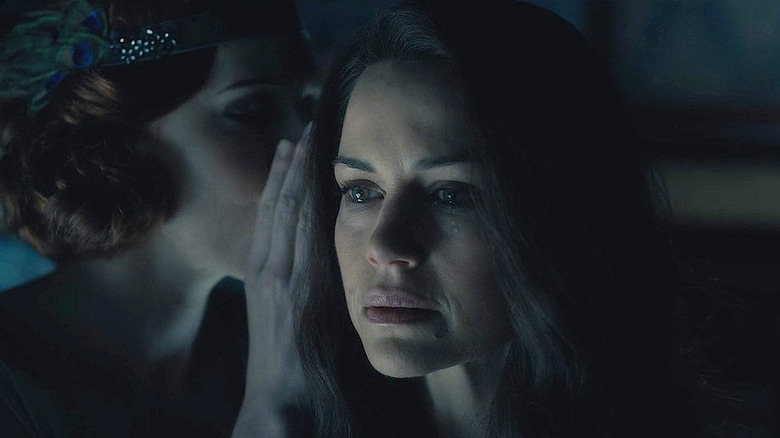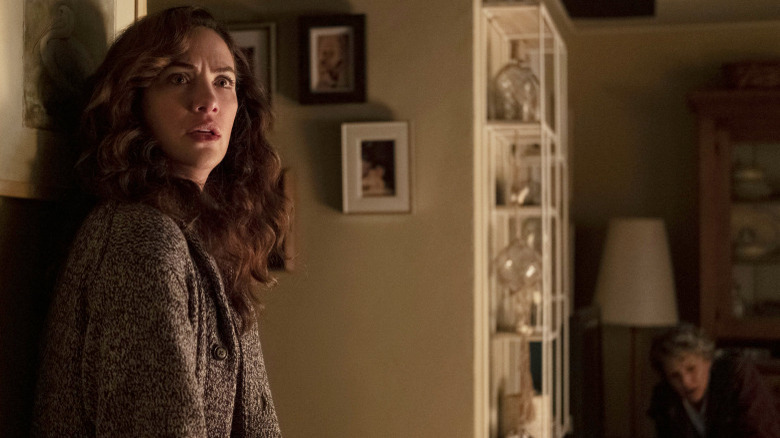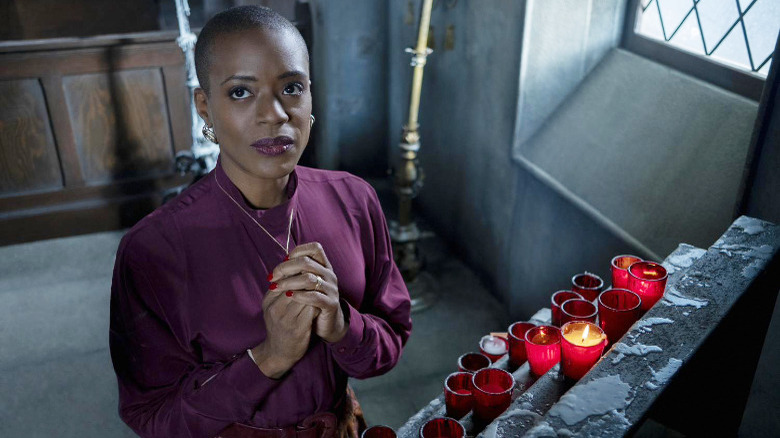The Fall Of The House Of Usher: Everything We Know So Far About Mike Flanagan's Next Netflix Horror Series
Shirley Jackson, Henry James — now it's Edgar Allan Poe's turn to get the Mike Flanagan miniseries treatment. The "Haunting" anthology creator is hard at work on yet another literary adaptation, this time in the form of "The Fall of the House of Usher." The show will mark his latest project for Netflix, coming after his acclaimed slasher film "Hush" and Stephen King movie "Gerald's Game," as well as the first two seasons of "The Haunting," his limited series "Midnight Mass," and "The Midnight Club."
The latter of those titles, a TV show Flanagan and Leah Fong ("Once Upon a Time") developed based on Christopher Pike's 1994 YA horror novel of the same name, only just premiered on Netflix and has garnered mostly good reviews. However, /Film's Chris Evangelista felt it failed to uphold the high standard we've come to expect from Flanagan, describing it as "inert and dull [and] lacking any genuine frights." That being said, if you're a horror fan who feels the more jump scares the merrier, you may find "The Midnight Club" to be more your speed (but don't quote me on that).
While promoting "The Midnight Club" at New York Comic Con (via Collider), Flanagan gave a fresh update on "The Fall of the House of Usher," stating it will span eight episodes and could arrive as soon as Spring 2023, assuming Netflix doesn't elect to "hold it back for spooky season." In light of that news, here's a rundown of everything else we know about the series at this stage.
What is The Fall of the House of Usher about?
"The Fall of the House of Usher" gets its title from Poe's short story of the same name, which follows the story's unnamed narrator as they journey to visit their childhood friend, Roderick Usher, at his remote countryside manor, only to realize it's more than just the Usher house that's rapidly (and dangerously) falling to pieces. Similar to how "The Haunting of Bly Manor" blends brand-new material with elements from several Henry James stories, the "Fall of the House of Usher" miniseries will mix and match aspects of different Poe titles along with re-imagining the titular horror tale.
If you're wondering why this isn't just a new season of "The Haunting," Flanagan has a simple explanation. Unlike "Bly Manor" or "The Haunting of Hill House," Poe's "The Fall of the House of Usher" isn't a literal ghost story (although its characters are very much "haunted" in other senses). Flanagan also claims the series is the complete opposite of the somber, slow-burn horror stories he's known for, describing it as a "heavy metal riff that's just blood-soaked and wild." That certainly sounds a-okay to me. If you can't get your macabre on adapting the work of one of the most gothic horror writers who ever gothic-ed, then what even is the point?
Who is working on The Fall of the House of Usher?
Mike Flanagan is (naturally) serving as head writer on "The Fall of the House of Usher" and is co-directing the series with his longtime director of photography Michael Fimognari (the latter of whom is branching out from YA fare after helming Netflix's "To All the Boys" sequels and two episodes of "The Midnight Club"). Joining the pair as executive producers on the show are Emmy Grinwis, Trevor Macy, and Melinda Nishioka.
Like most Flanagan projects of late, the cast for "The Fall of the House of Usher" features multiple actors who've starred in one or more of his previous projects. Their ranks include Carla Gugino and Henry Thomas ("The Haunting of Hill House"), Carl Lumbly and Kyleigh Curran ("Doctor Sleep"), Rahul Kohli and T'Nia Miller ("The Haunting of Bly Manor"), Zach Gilford and Annabeth Gish ("Midnight Mass"), and Kate Siegel ("Hush"). Also onboard is Gugino's "Gerald's Game" co-star Bruce Greenwood — filling a role that Frank Langella initially occupied prior to him being fired over his alleged sexual misconduct — and some rando named Mark Hamill.
/Film will let you know when "The Fall of the House of Usher" gets an official release date.


